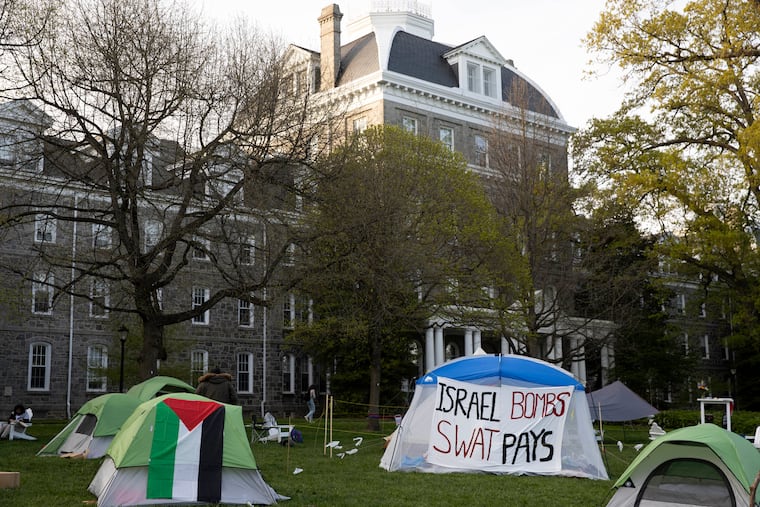Why some Philly-area college students are not voting in the presidential election
I am casting a ballot, but some of my classmates at Swarthmore are choosing to abstain.

I turned 19 last month, and this fall will be my first time voting. At the same time, a public statement is circulating on my campus, Swarthmore College, to boycott the election. As Nov. 5 approaches, I’ve started to question where I stand not just on the candidates, but the statement I will make by choosing to vote at all.
Nineteen years isn’t long to have witnessed global politics, but one thing is clear: World leaders are not saints. Both Donald Trump and Kamala Harris are players in a game of wealth and power that denies groups of people their land, humanity, and social mobility and is funding the death of at least 41,534 Palestinians in Gaza.
I respect my classmates who have seen footage of massacres on TikTok and draw a moral line on voting for candidates they don’t believe in. That being said, the next four years in America will look different depending on who wins, and we shouldn’t give up on voting if we want to see positive change.
A lot is at stake. The choice to vote is the choice to stand behind the nuances in our government — nuances that define access to medical procedures, affordable housing, education, and, yes, how our government redefines who in the world has a right to life, liberty, and freedom from deportation and incarceration. Focusing only on the downsides of both candidates flattens this nuance.
On Aug. 10, Swarthmore’s and Temple’s Students for Justice in Palestine and the Philly Palestine Coalition jointly shared a photo illustration on Instagram that depicted Trump and Harris as war criminals with the message, “Reject the 2024 Election,” to a combined following of roughly 42,000 people.
Students for Justice in Palestine is an organization with over 350 campus chapters dedicated to Palestinian liberation. At Swarthmore, Students for Justice in Palestine is working to boycott, divest, and sanction major companies that fund genocide in Gaza through intersectional activism, and more broadly to protest colonial violence.
“Participating in the upcoming presidential election is a declaration of support for the injustices inflicted on Palestinians and all who are affected by U.S. policies whether blue or red, we are looking at two sides of the same colonial coin,” the statement reads.
The above issues — normalizing oppression and both parties’ lack of condemning the violence in Gaza — are the main reasons behind a liberal Philadelphia-area movement to protest the election.
However, there is still a wide variety in Swarthmore students’ opinions on voting, even within Students for Justice in Palestine.
Most students I’ve talked to want an end to the war and will vote, despite mixed feelings on the candidates. Many choose to focus their energy on grassroots efforts that have a direct impact on communities in ways voting once every four years does not.
While I see the reasoning behind abstaining as part of broader activism, I don’t think voting alone is a form of complicity. Nuances matter. Whom we elect, and who will be more open to listening to protesters, is crucial. While we have yet to see if Harris will stray from Joe Biden’s weapons funding, Trump’s stance is clear. He has promised to deport any international students who have protested for Palestine.
Trump also promises to actively undo policies that have protected the rights of people of color and women, whereas Harris does not.
I like to think of the election as similar to the SEPTA station at the base of Swarthmore’s campus. Two trains are coming to take us in different directions this November. Among us waiting on the platform are those who have their homes and futures at stake. Some, from America’s island territories, along with those who can no longer vote under the law, don’t get a say in where we go.
Some can voice an opinion but won’t in good conscience, because the hard reality for those of us who oppose current government actions, including the war in Gaza, is that neither side will take us directly to where we need to be.
But whether we participate as individuals or not, there will be a group decision on which train to take, and we will all be boarding it when the time comes. The way I see it, one will take us closer to a better future while one will continue to condone violence. There’s too much on the line to not choose a side.
Nina Sablan is a sophomore at Swarthmore College, where she studies philosophy and plays on the basketball team.